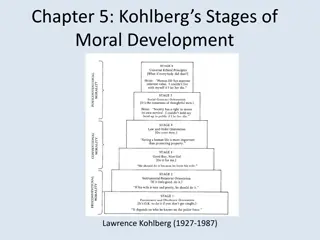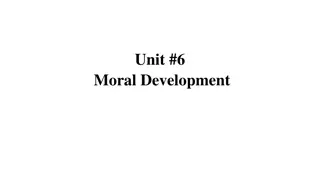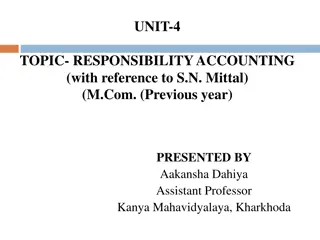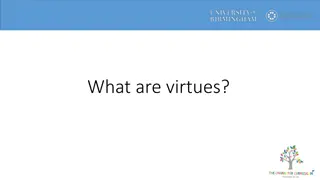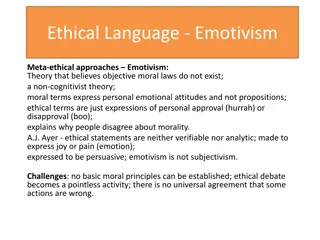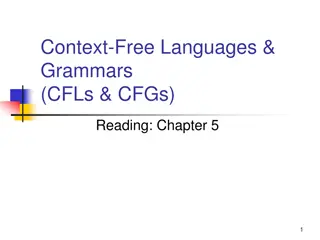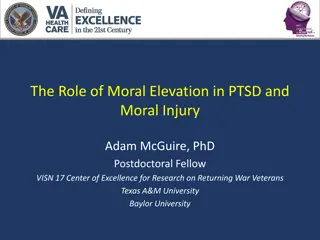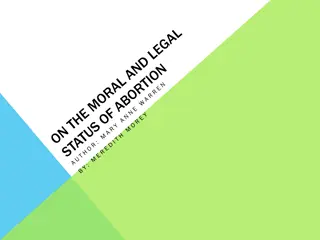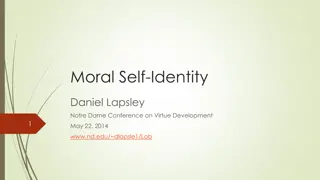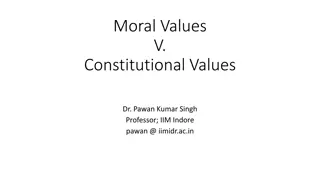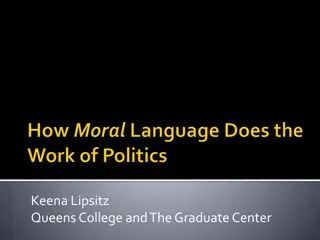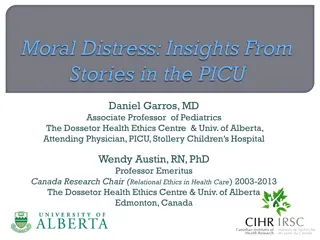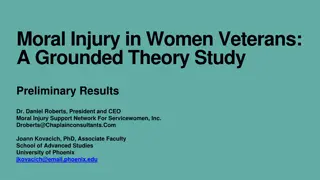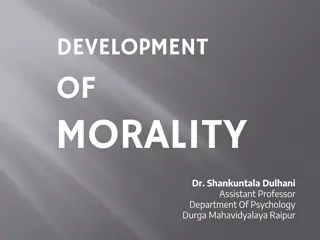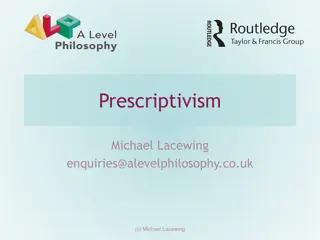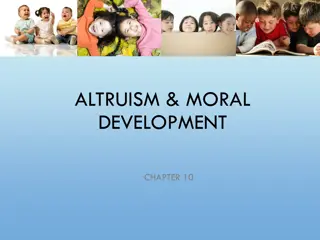Moral Responsibility and Free Will Implications in a Contemporary Context
This text delves into the implications of free will and libertarianism on moral responsibility, examining the ideas of various philosophers and thinkers such as Pelagius, Arminius, Sartre, and more. It explores the concepts of moral agency, determinism, normative ethics, religious beliefs, and the connection between God, evil, and human actions. Furthermore, it analyzes the impact of predetermined outcomes on moral judgment, blame, and the validity of ethical frameworks. Real-world incidents like the Lewes stabbing are used to highlight how such philosophical discussions intersect with practical societal issues.
Download Presentation

Please find below an Image/Link to download the presentation.
The content on the website is provided AS IS for your information and personal use only. It may not be sold, licensed, or shared on other websites without obtaining consent from the author.If you encounter any issues during the download, it is possible that the publisher has removed the file from their server.
You are allowed to download the files provided on this website for personal or commercial use, subject to the condition that they are used lawfully. All files are the property of their respective owners.
The content on the website is provided AS IS for your information and personal use only. It may not be sold, licensed, or shared on other websites without obtaining consent from the author.
E N D
Presentation Transcript
4 F Implications of Free will/ Libertarianism on Moral Responsibility What ideas do we need to know for this section? Pelagius, Arminius, Sartre, Rogers, Dr Sirigu For AO2 evaluated against Augustine, Calvin, Locke, Darwin, Dennett, Pavlov, Skinner, Hobbes, Ayer and Vardy Explain my colour code
1. Moral agents are so hopelessly corrupted that we are absolutely incapable of doing anything good by our own forces. Spinoza Beyond moral agents control Darrow, Bulger or Mobley Act as a moral guide Redundant if humans predetermined We can overcome determining factors using intelligence Omnipotent and omnibenevolent God has predetermined moral agents lives For those God foreknew he also predestined. Romans 8 10. God could have predestined primary and secondary cause miracles before the creation of the universe Recap 4 C 2. 3. 4. 5. 6. 1. Why would Augustine s theory lead us to the conclusion that we have no moral responsibility? Who said there is no absolute or free will, the mind is determined to wish this or that by a cause. ? Why would a determinist claim it was unfair to punish people for immoral actions? Briefly explain one legal case that used this determinist view? What are normative ethics? What are the implications for normative ethics if we are predetermined? What is Vardy s soft determinist view of moral responsibility? List two concepts of God that can be challenged if we are predetermined. Why might determinism make prayer a waste of time? 10. How can Christians accept miracles and predestination? 2. 3. 4. 5. 6. 7. 8. 9. 7. 8. 9.
Specification Content The implications of libertarianism on moral responsibility: the worth of human ideas of rightness, wrongness and moral value, the value in blaming moral agents for immoral acts, the usefulness of normative ethics. The implications of free will on religious belief: the link between God and evil, the implications for God s omnipotence and omnibenevolence, the use of prayer and the existence of miracles. Guidance to teachers Candidates need to appreciate the implications of free will on moral responsibility. More specifically the worth of human ideas of rightness, wrongness and moral value, the value in blaming moral agents for immoral acts and the usefulness of any normative ethics (such as Natural Law, Situation Ethics, etc.). Candidates must also understand the implications of free will on religious belief: specifically, implications on the link between God and evil, the implications for God s omnipotence and omnibenevolence, the use of prayer and the existence of miracles.
Moral responsibility? Lewes Waitrose cordoned off after stabbing Waitrose was cordoned off and a teenager was taken to hospital with a stab wound after a fight in Lewes. A Sussex Police spokesman said an incident in the town involving a large group of youths resulted in one being stabbed and two others sustaining minor injuries. The youths had gathered outside out side the store shortly after 18:00 GMT. A 16-year-old local boy was taken to hospital in Brighton with a knife wound to his left leg, but was discharged after treatment. The two other boys who were injured were also local, and aged 15 and 16. Police believe three boys, aged 16, 15 and 14, all from Brighton, may have been responsible. BBC Read the news story where three boys have been accused of criminal and/or immoral activity. Identify ways in which it may relate to the following issues: - Is there any worth in our judging this act as right or wrong? - Is there any value in blaming or praising this person for their acts? - Is there any use in applying our normative ethical theories in this situation? As you answer these questions can you maintain the view that the person is free, or are you forced to accept that the agent must be caused in some way?
What do you need to know for AO1 4F Implications of Free will/ Libertariansim? on moral responsibility What are the implications of free will and libertarianism on moral responsibility? What are the implications of free will and libertarianism on normative ethics? ..on religious belief Implications for God s omnipotence, Implications for God s Omni benevolence, The use of prayer, The existence of miracles The link between God and evil
Strengths and weaknesses of libertarianism The extent to which philosophical, scientific and/or psychological views on libertarianism inevitably lead people to accept libertarianism Starter use the big white boards to create list of strengths and weaknesses of libertarianism. Use your knowledge of determinism to help you Challenges Sartre no proof, Locke is more convincing (or Ayer or Hobbes) Sirigu doesn t prove no cause, other scientitists believe we are determined Rogers- don t know if we are conditioned by social factors. Psychologists believe we are determined - Pavlov Strengths Sartre we experience being free Sirigu evidence, empirical support, Haggard (Peer support) Rogers support from psychologists
Issue 10: The extent to which free moral agents should follow a normative ethic AO2 Lines of argument Free moral agents should follow a normative ethic Free moral agents should not follow a normative ethic If we are truly free beings, then following the rules of a normative ethic places a limit on our freedom and responsibility (it is acting in bad faith Sartre) we need to make ourselves freely without any system. Many deontological normative theories such as divine command theory or natural law require a rigid observance to rules that prevent us from acting freely. Rogers thinks that the best way to maturity is to break free of such ingrained restrictive habits and make decisions for ourselves. Some normative theories such as utilitarianism or situation ethics are completely subjective in nature since you can justify any decision (despite, for example, utilitarianism s claim to be scientific). We don t fully recognize this because we want them to be objective! They can offer no real guidance; we must figure out our own path. Normative ethics are very useful if we have free will because they act as a moral guide for us as individuals who live within a society. If we are free, then our actions matter, and normative ethics show us the behaviour that will benefit us individually, socially or spiritually. Without a normative ethic it would be impossible to praise or blame people for their actions because we would have no standard by which to judge them. There is freedom within the limits of a normative system. There is a place in all normative ethics for thinking, calculating and considering. Within Natural Law, for example, one has to determine how human laws can best reflect the primary and secondary precepts. In Utilitarianism one needs to make calculations about pleasure and pain.
If human beings are truly free then God cannot intervene in the world at all . Evaluate this view 1. In what ways can God be said to intervene with the world? Think of 4 C and F 2. Take a post-it and write a response to the statement above and then stick it on the board. 3. Organise the responses into an AO2 Essay plan 4. Take a photo DIL- Write up essay plans
Issue 11: The degree to which free will makes the use of prayer irrelevant AO2 Lines of argument Free will does not make prayer irrelevant Free will does not mean that we do not need help in life! Theologians like Pelagius and Arminius argue that we need a relationship with God to know His will for us prayer develops this relationship. Sin is still a powerful reality even though we have free will. Pelagius says that we need everything in our arsenal to overcome it including asking God for help through prayer. Free will means that we can choose to sin (as well as to do good). Even theologians who are against predestination believe it is possible to become so stuck in sin that we lose our freedom of choice. Prayer helps us to obtain forgiveness and strength from God when we have freely chosen the wrong path. This is consistent with free will. We could argue that Rogers sees it as a mark of maturity if we can overcome our conditioning to achieve self-actualisation prayer might help with this. Sirigu has identified the place in the brain where choices are made. If this is a mark of free will then it follows that the decision to pray is an exercise in free choice. Free will makes prayer irrelevant If grace is irresistible (as Calvin proclaimed) or, if holiness is unobtainable apart from predestination (as Augustine taught), then it follows that no amount of prayer can bring us grace; prayer is therefore useless. Prayer overrides free will: if God intervenes when we pray, then our free will is actually suspended. Prayer, then, is incompatible with free will. According to Sartre, we make our choices in abandonment and despair which means we cannot rely on God to guide us through prayer. Prayer cheapens our choices! If we are truly free to make both good and bad choices, it is necessary for us to live with the results of those choices. Any prayer to ask God to intervene in human affairs causes us to lose our freedom. If I am going to be forgiven every time I sin, do I ever really sin? After all, Rogers does not say we need prayer to achieve self-actualisation.
Issue 12: The degree to which beliefs about free will can be reconciled with belief about predestination AO2 Lines of argument FW can be reconciled with PD FW cannot be reconciled with PD The idea of foreknowledge can be invoked to explain the fact that Christianity calls us to make choices and yet there are verses which suggested that things are predetermined. That is, God could foresee our actions (thus they are predetermined in time) yet not be responsible for our performance of them. Hence, we are also free. Scripture gives evidence for both free will and determinism. Since scripture is God breathed, it would be a matter of faith to believe both, even if it doesn t seem clearly logical to us. Predestination is known only by God who is outside of time and space. In time and space, we experience making choices. Thus, both are real: we experience the latter, though the former is also true. If God has predestined humans, then there is no way logically that it makes sense to say we are free. No decision that we make could make any difference to our future. Any decision we make, ultimately is predetermined and thus illusory. Theological thought would say, too, that reward and punishment make no sense if our actions have been dictated. Modern thought, too, sees predestination as incompatible with free will: thinkers such as Rogers and Sirigu in different ways emphasise the power of choice and, by implication, do not believe in predestination. If God is omniscient AND omnipotent it is impossible for human beings to make a decision that he does not control and know about. A God with these qualities is by necessity one who has predetermined our behaviour and thus our eventual outcome. This is not consistent with any concept of us being tabula rasa (a blank slate, free of predetermined goals). Free will damages God s absolute authority. It suggests that we can change God s mind or affect God s actions in some way. God as supreme authority over all things must predetermine our behaviour because he is in control and so we cannot be free as well.
DIL for Monday 12th March 1. Complete essay plans for Issues 9 11 (use your notes and pages 32 35 of Booklet 2) 2. Create two lists of Biblical quotes (Use Booklets 1 and 2) one in support of predestination and one in support of Free Will Learn it! 3. Complete the double sided A3 summary revision sheet on Theme 4 If you want to use the headings from the sheet and write/type up your summary notes that is fine. We have now completed Religion and Ethics Themes 1 4 You will have a mock exam on Ethics in the week beginning the 26th of March. It will be a full paper there will be one compulsory theme




